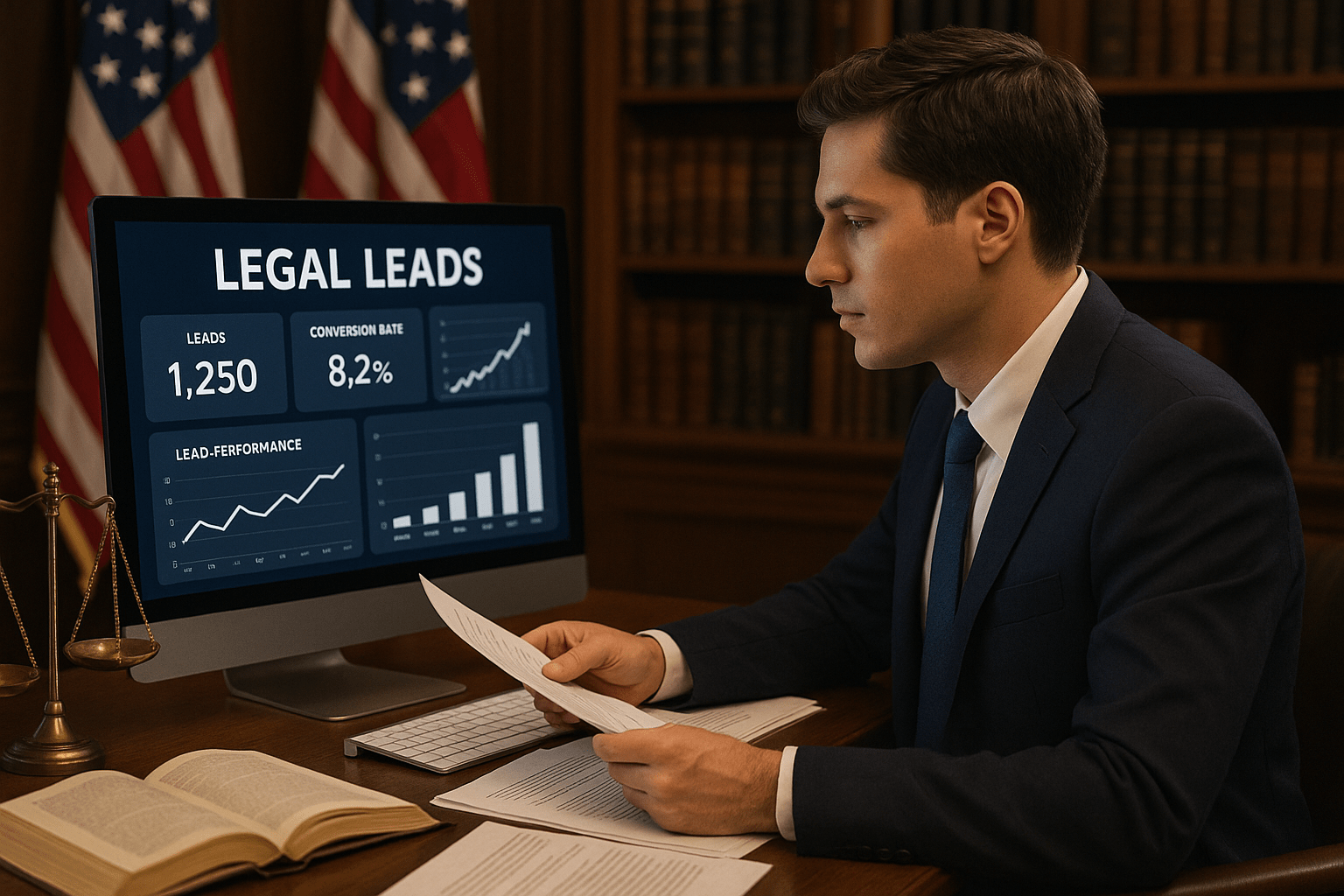- Mon - Fri: 8.30 AM - 5:00 PM
- 26565 Agoura Rd., 200, Calabasas, CA 91302
- 818-884-8075

What Is Lead vs. Crime? How Legal Leads Support Law Firm Growth
Understanding What Is Lead vs. Crime in Law Firm Marketing
When asking what is lead vs crime, it’s important to distinguish between marketing terminology and legal offenses—one refers to client acquisition, the other to violations of the law. Many people confuse the term lead in law with criminal cases. However, in legal marketing, a lead refers to a potential client actively seeking legal assistance, while a crime is a legal violation requiring legal representation. Understanding this distinction is critical for law firms engaged in both criminal defense and legal lead generation.
But what is a legal lead? And how do law firms acquire the right clients while staying compliant with legal advertising rules? This article explores lead vs. crime, explains legal lead generation, and provides best practices for lawyers and law firms to improve their case acquisition strategies.
What Is Lead vs. Crime?
A legal lead is a marketing term referring to potential client inquiries, whereas a crime refers to an act that violates the law.
Key Differences:
- Legal Lead – A prospective client looking for legal representation.
- Crime – A legal offense requiring defense attorneys and court proceedings.
Law firms, especially those in criminal defense, seek criminal law leads—individuals facing DUI, assault, theft, and other charges who need immediate legal assistance. Understanding this distinction allows law firms to implement attorney lead generation strategies effectively while focusing on case acquisition for lawyers.
What Is a Legal Lead?
A legal lead refers to a potential client actively searching for legal services. These individuals may have searched online for a lawyer, completed a contact form, or responded to a legal marketing campaign.
Types of Legal Leads:
- Criminal law leads – People charged with crimes such as DUI, theft, or assault.
- Personal injury leads – Individuals injured in car accidents, slip and falls, or medical malpractice.
- Family law leads – Clients seeking legal help for divorce, custody, or child support.
- Business law leads – Companies needing assistance with contract disputes or corporate cases.
Why Qualified Legal Leads Matter:
- Higher conversion rates – Clients actively seeking help are more likely to hire an attorney.
- More efficient case acquisition – Saves time and resources for law firms.
- Better return on investment (ROI) – Effective use of law firm lead generation strategies ensures high-value cases.
Why Legal Leads Matter for Lawyers and Law Firms
Investing in qualified legal leads provides several advantages for law firms:
- Increased case acquisition – Ensures a steady flow of high-quality client inquiries.
- Optimized lawyer marketing efforts – Allows firms to target the right audience.
- Compliance with legal advertising rules – Helps attorneys follow ABA and state bar regulations.
For criminal defense attorneys, legal leads are time-sensitive, as individuals facing charges need immediate representation. By leveraging legal marketing strategies, law firms can ensure faster case intake and better client retention.
Best Practices for Generating Legal Leads
1. SEO for Law Firms
- Optimize website content for high-intent keywords (e.g., “hire a criminal lawyer near me”).
- Create legal blog content targeting frequently asked questions.
- Use Google My Business for local SEO visibility.
2. PPC Advertising for Lawyers
- Run Google Ads campaigns focused on case acquisition for lawyers.
- Create optimized landing pages with clear CTAs for better conversions.
3. Social Media Marketing
- Engage potential clients via Facebook, LinkedIn, and Instagram.
- Use paid advertising to reach individuals searching for legal services.
4. Legal Advertising Compliance
- Ensure all lead generation efforts follow ABA and state bar regulations.
- Avoid misleading claims in legal advertising.
By following these best practices, law firms can attract qualified legal leads ethically and effectively.
How to Choose a Legal Lead Provider
Not all legal lead generation providers offer high-quality results. To ensure success, law firms should consider:
- Lead verification & exclusivity – Ensuring leads are screened and exclusive to the firm.
- Compliance with legal marketing ethics – Avoiding misleading claims or aggressive solicitation.
- ROI & cost-effectiveness – Analyzing performance to ensure a positive return on investment.
- Reputation & client reviews – Checking testimonials from other law firms.
Red Flags to Avoid:
- Non-exclusive leads shared with multiple firms.
- Low-quality, unverified client inquiries.
- Lead providers violating legal advertising compliance rules.
Clarifying Lead vs. Crime to Improve Legal Marketing Success
Understanding what is lead vs crime is essential for law firms that balance legal marketing with professional responsibility. While a crime is a legal violation requiring defense, a lead is a prospective client actively seeking help. Recognizing the difference helps attorneys develop smarter marketing strategies, increase case acquisition, and remain compliant with legal advertising rules.
Grow Your Firm with Qualified Legal Leads from Legal Brand Marketing
Whether you focus on criminal defense, personal injury, or family law, Legal Brand Marketing helps your law firm connect with exclusive, high-intent legal leads. Our solutions are built on compliance, quality, and ROI—so you can focus on serving clients, not chasing them.
Start acquiring verified legal leads that grow your firm ethically and effectively—partner with Legal Brand Marketing today. Contact us today to refine your lead generation strategy and grow your law firm!
Frequently Asked Questions About Lead vs. Crime in Legal Marketing
1. Can someone charged with a crime also become a legal lead?
Yes, individuals charged with a crime often become legal leads when they search for legal representation. These are known as criminal law leads and are crucial for defense attorneys seeking new clients.
2. How does legal lead generation differ from general digital marketing?
Legal lead generation is more targeted and regulated, focusing specifically on connecting attorneys with individuals actively seeking legal help—often under strict ethical guidelines set by bar associations.
3. Are legal leads only used in criminal law?
No, legal leads apply across various practice areas such as personal injury, family law, business law, and more. Criminal law is just one category among many.
4. What happens if a law firm buys non-exclusive leads?
Non-exclusive leads are shared with multiple firms, which often leads to increased competition and lower conversion rates. It’s usually better to invest in exclusive, high-intent leads for better ROI.
5. How can a law firm tell if a lead provider is violating advertising compliance?
Red flags include exaggerated claims (like guaranteed case wins), aggressive sales language, or failure to disclose lead sources. Always check that providers align with ABA and state bar advertising guidelines.
Key Takeaways
- Legal leads and criminal offenses are two distinct concepts, with leads referring to marketing prospects and crimes being violations of the law.
- Criminal law leads are highly time-sensitive, making rapid intake and follow-up critical for attorneys handling urgent legal matters.
- Understanding the difference between lead and crime empowers law firms to structure more ethical and effective marketing strategies.
- Qualified leads improve efficiency and ROI, especially when they are tailored to the law firm’s practice area and handled with compliance in mind.
- Choosing the right lead provider is vital to avoid compliance issues, low-quality prospects, and wasted marketing investment.




